TSA Weekly, May 4 - 8, 2009

News

More News
- Information Protection: You Have a Role to Play
- TSA and International Partners Work on Security Issues
- This Week’s Featured Local Newsletter
Column
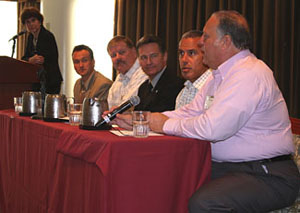
Deborah Katz, Director, Office of Collaborative Strategies, moderates a panel of AFSDs discussing the building of local partnerships to achieve Level 3 Standards for the Integrated Conflict Management System. Seated, from left, are AFSDs Scott Lorenzo, Columbus, Ohio; Frank Prusko, Milwaukee; Nick Lilak, Moline, Ill.; Sal Badalamenti, Detroit; and Mike York, Columbus. Read more. Photo by Ann Oh

Graphic by Ann Oh
Your Weekly E-mail Tip
Ever wondered how to confirm whether a security officer’s e-mail account exists? Training coordinators or security managers have access to the Outlook Global Address List (GAL) and can look up the security officer’s name. If the officer is listed in the GAL, an e-mail account already exists.
News
TSA Announces New ICMS Standards
By Carol Worth, ICMS Coordinator, Rochester-Monroe (N.Y.) County/Elmira-Corning Regional airports

TSA launched a new level of standards for the Integrated Conflict Management System (ICMS) at the National ICMS Coordinators Conference in Arlington, Va., last week. These Level 3 Standards will impact every TSA employee at every location, as did Level 1 and 2 Standards implemented last year.
ICMS Standards begin with the premise that conflict is normal and by implementing a system of skills, structure and support, conflict can be managed and often can provide an opportunity to reach better decisions and solutions collaboratively.
Level 1 and 2 Standards provided a foundation for implementing the system locally, including places and ways for employees to feel safe in raising ideas and concerns and having them respectfully heard and responsibly addressed. Level 3 Standards, when implemented, move the bar much higher with strong governance (through local ICMS steering committees), effective employee councils and a common language for respectful dialogue to happen every day.
"ICMS Coordinators and Employee Advisory Councils have laid the groundwork for so much that is positive at TSA today and they laid the foundation for ENGAGE! and COACH! training," said Acting Administrator Gale Rossides.
At the conference, 150 enthusiastic ICMS coordinators from across the nation addressed skills, structure and support:
Skills: With employees receiving Conflict Management Essentials or Cooperative Problem Solving training last year, new training for facilitators of councils and workgroups will soon be available.
Structure: Level 3 requires local sites to ensure that options for raising issues and ideas are effective, have strong safeguards and are routinely communicated to the workforce.
Support: Level 3 requires all sites to:
- show visible support from leadership and management;
- build and develop ICMS team members;
- begin measuring and reviewing the effectiveness of system components;
- develop a communications plan for messaging to employees on ICMS principles and practices and options for addressing issues; and
- integrate and align local practices and processes with ICMS principles.
“Developing a Model Workplace with our ICMS may truly be the single most important thing TSA has done to support our workforce,” said Elizabeth Buchanan, Deputy Assistant Administrator for the Office of Human Capital. “The communication, respect and teamwork fostered by the ICMS have helped us create a solid foundation for the open collaborative work environment we have been building across TSA.”
Two core ICMS principles are collaborative decision making and applying the FIT test - fair, inclusive and transparent practices in decision making and problem solving.
To learn more about your ICMS or employee council, contact your local coordinator. View the list of ICMS award winners.

Interaction, Engagement Credited in Saving Life
By Jennifer Seastrand, Expert Security Training Instructor, Phoenix Sky Harbor International Airport
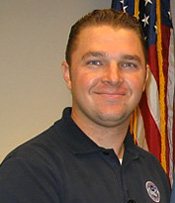
BAO Joshua Bonebrake. Photo courtesy of TSA Phoenix Sky Harbor International Airport
When Stephen Hawthorne, Expert Security Training Instructor, stepped outside his Phoenix office recently, little did he know that his network of co-workers would be so important to him. He fell and hit his head on the pavement. The ensuing concussion rendered him unconscious, so he was unaware of what happened next.
Bomb Appraisal Officer (BAO) Joshua Bonebrake immediately began CPR and continued to do so for the five long, interminable minutes it took for paramedics to arrive. Two months later, Hawthorne is alive and well, thanks to the interaction, engagement and coaching of one of his peers.
At a recent ceremony where he was given the Phoenix Award for saving a life, Bonebrake accepted the highest local TSA award one can receive with his usual BAO nonchalance and confidence. Speaking for the other BAOs in his squad, and all employees who have experienced the power and confidence that comes from practicing the valuable lessons taught in ENGAGE! and COACH! (and CPR), he said, “Saving lives is what we do.”
Security Evolution emphasizes the value of interaction between TSOs and passengers, agency stakeholders and, indeed, other TSOs, all to provide greater security through increased domain awareness. And, as in this case, relying on each other may actually save someone’s life.
Evolution: In the FSD's Own Words
ENGAGE! and COACH! is a process for the officers, just like the principles of ICMS [Integrated Conflict Management System]. The process integrates skills, structure and support of the ICMS with the Evolution training to develop the officers' skills and effectively use their instincts and learned skills to succeed in our mission. – FSD Don Barker, Port Columbus (Ohio) International Airport
Engage the Evolution team with your questions and suggestions at ENGAGEevolution@dhs.gov.
More News
Information Protection: You Have a Role to Play
By Michael Simons, Office of Strategic Communications/Public Affairs
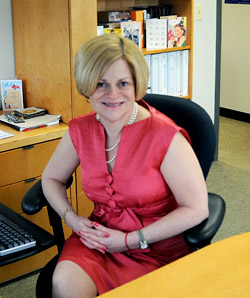
Margot Bester. Photo by Rigina Pietrowski
Government officials received notification recently that a file containing the blueprints and avionics package for President Barack Obama’s helicopter, Marine One, were found at an IP address in Iran. The highly sensitive plans apparently were exposed because a government contractor with access, stationed in the U.S., downloaded a peer-to-peer file-sharing program on a work computer system. File-sharing programs also allow access to your hard drive and expose sensitive data.
Everyone has a role to play in protecting sensitive information. That role can be as simple as not installing file-sharing software on a work computer. Doing so is against information security policy because it opens access to the TSA network, our systems and data. At TSA that can lead to considerable harm.
“TSA employees, all of us, are the key to safeguarding TSA’s sensitive information - the information we handle,” said Margot Bester, Principal Deputy Chief Counsel and Information Protection Oversight Board Co-Chairman. “The first safeguarding step is to increase awareness around the fact that threats are very real. We each have the responsibility - along with the ability - to protect the information we handle.”
Human error is the largest single cause of data breaches, according to a recent report by the Identity Theft Resource Center of San Diego. In 2008, lost or stolen laptops and other removable electronic devices, along with the accidental exposure of consumer data, accounted for more than 35 percent of all reported incidents.
But not all incidents are mistakes. The Center reported computer hacking and software that steals data were blamed for nearly 14 percent of breaches. DHS figures, as reported in the Washington Post on March 3, 2009, showed unauthorized access to U.S. government computers and, more ominously, the introduction of malicious software or viruses are both growing. Incidents of computer tampering more than doubled between 2006 and 2008.
Also troubling, reports the Center, data theft by current and former employees more than doubled to nearly 16 percent in 2008.
“We must embrace our role as ‘sensors,’” said Bester. “Each of us needs to engage in sound information protection practices and ask, ‘Is there something I am doing that could compromise our zone of protection and let in something or someone bad?’”
For more information on how to properly safeguard and securely share sensitive information, visit the Information Protection iShare page. (Search “information protection” on the iShare home page.) It has links to program-specific pages for Privacy, SSI, IT Security, OPSEC, INFOSEC, OpSec, and Insider Threats (Intranet access required).
Information Protection: What You Can Do
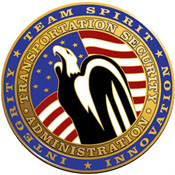
Graphic by Ann Oh
Here are a few things you can do to prevent data breaches:
To protect sensitive security information:
- Properly mark TSA airport-specific forms as SSI, using the SSI header and footer. Unused or blank as well as completed forms may contain SSI.
To protect privacy information:
- Learn to recognize personally identifiable information (PII). When traveling, keep laptops or electronic storage devices under your control. Do not leave them in a car overnight or in plain sight in a parking lot. Do not mail or courier sensitive PII on CDs unless the files on the CD are encrypted. And when sending Sensitive PII, check the addressee or distribution list to ensure you are sending it to the right person.
To protect electronic information:
- Do not plug unauthorized thumb drives or devices into TSA equipment.
- If you have taken equipment out of the country or used it on an outside system, have it scanned before you plug it back into our network (check with IT Security).
To protect classified information:
- Responsibility for maintaining the security of classified information rests with each person having knowledge or physical custody of that material. Any employee or contractor who observes a security violation must immediately report it to the Office of Security, Security Management Division.
To protect unclassified information:
- Report repeated, inappropriate attempts to obtain sensitive or classified information; note persistent inquiries regarding your employment; and immediately report suspicious queries or activities to the TSA Office of Security.
To protect against insider threats:
- If you see something, say something. Report activities that potentially compromise trusted access and/or sensitive information.
TSA and International Partners Work on Security Issues
By Loretta McNeir, TSA Representative for Trinidad and Tobago
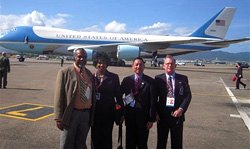
Standing near Air Force One, from left, Ramesh Lutchmedial, Director General of Trinidad and Tobago Civil Aviation Authority; Loretta McNeir, TSA Representative; and Transportation Security Inspectors Kevin Yap-Sam and Thomas Finneman. Photo by Ted Martin
TSA Representatives collaborated with international security partners at the 2009 Summit of the Americas where they showcased their respective capabilities in air and ground security.
The Summit, held April 17-19 on the Caribbean islands of Trinidad and Tobago, focused on the ways countries can work together to provide energy security and environmental sustainability. It was also a unique opportunity for both islands to demonstrate their readiness to provide comprehensive security to prevent any disruptions of Summit activities by protestors.
“Through partnerships with our Caribbean neighbors on transportation security initiatives, we continue to expand and strengthen our borders of security,” said Cindy Farkus, Assistant Administrator for Global Strategies. “This event also highlights the broad and varied experiences of our agency professionals to work collaboratively with international partners toward improving the security posture of transportation across the globe.”
Other participating DHS components included Customs and Border Protection, which ensured special provisions for aircraft carrying U.S. dignitaries, and the Secret Service, which provided protection for President Barack Obama.
As a result of TSA’s ongoing partnership with the Trinidad and Tobago Civil Aviation Authority, agency representatives were invited to return and assist with airport security at the Commonwealth Heads of Government Meeting later this year. More than 50 heads of state are expected, with significantly more non-commercial aircraft traffic than at the Summit.
This Week’s Featured Local Newsletter
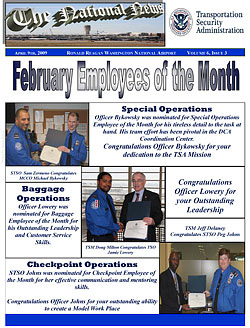
The April issue of The National News, published by TSA at Ronald Reagan Washington National Airport, stands out for its attention to the workforce. On the cover page, the latest crop of employees of the month is featured prominently with photos and names. On the inside, the job of a Transportation Security Inspector is explored, along with a background article on a staff employee and a brief story about an officer who received an award for his “outstanding work” at the checkpoint. Human resources information, Performance Accountability and Standards System tips and trivia round out the issue.
An archive of featured newsletters is available on iShare in the Communications Central section, which is linked from the home page. In the same section, the DHS branding guideline document is available in PDF for download.
Column
TSA’s Mobile Computing Capabilities are Mission-Oriented
By Nicole Raymond, Office of Information Technology

As was recently made evident by the H1N1 flu outbreak, an effective response to emergencies depends on flexibility and immediacy. To support the mobility this type of response requires, the Office of Information Technology established an iShare page to provide employees with information on mobile computing. Included are instructions on how to set up a Virtual Private Network (VPN) connection, how to use Outlook Web Access to view TSA e-mail, and how to access TSA voice mail remotely.
The new OIT iShare page is easy to find by searching “mobile computing” on the iShare home page.
All TSA computers are equipped with VPN capability, and all TSA employees and contractors are furnished with VPN accounts. To verify your account, try to connect with VPN from your laptop, using the instructions available from the iShare site. If you are unable, or if you have questions about accessing your TSA accounts, please contact your office’s Information Technology Point of Contact.
Kudos & Clips
At the Airport, Somebody’s Watching
By Tom Fontaine, Beaver County Times (Pa.), May 2, 2009
Two things for air travelers to know: Body language doesn’t lie, and chances are someone is studying yours as you baby-step your way through line at an airport security checkpoint. Read more.
BWI Checkpoint Rollout Anniversary (And More...)
From TSA’s Evolution of Security Blog, April 29, 2009
While scanning the blogosphere as I do every morning, I came across a weekly column from a Transportation Security Officer in the Londonderry Online Hometown News called “Joe’s Two Cents.” His latest article describes a day when his checkpoint screened a group of Wounded Warriors. Check out his touching story: No Big Deal…
This is the friendliest security crew I have ever seen. Everyone was personable, professional and helpful. I felt like I was at the Hilton.
Isaac Robinson, Madison, Wis., to Nancy Mello, Customer Support and Quality Manager, Dane County Regional Airport (Madison, Wis.). April 20, 2009.
After 24 hours, I'm still impressed with our treatment through [Fayetteville (N.C.) Regional Airport]. … Going through the security checkpoint was 100 percent stress-free. Your staff was smiling, friendly and helpful. My husband had a knee replacement and he was treated with respect. It was a nice beginning to our long trip home. It may be another day on the job for the employees, but it was very pleasant for us.
Valerie and Steve Kaufmann, Philadelphia, to Amy Hatcher Humpherson, Customer Support and Quality Improvement Manager, Raleigh-Durham (N.C.) International Airport and Eastern N.C. spoke airports. April 2, 2009.
TSA Experience
TSA Iowa Completes ‘Have a Heart’ Food Drive
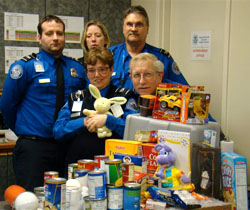
Photo by Tami Michaud
Officers at Iowa airports recently wrapped-up a month-long drive for donations collecting more than 1,000 pounds of food and clothing for the area’s needy families. Southeast Iowa Regional donated 111 items from its collection to a local church that was recently robbed while Mason City Municipal gave more than 400 pounds of food and clothing to a local food bank. Eastern Iowa (Cedar Rapids) delivered four van loads of donated food, clothes, toys and household items to a women’s center that lost everything in last year’s floods and Des Moines International donated 342 pounds of goods to a local food bank. “It was a privilege to participate in this food drive,” said Supervisory TSO Wynetta Green, Eastern Iowa. “This was a wonderful opportunity to give back to our community!” Pictured from left (rear), Eastern Iowa Airport TSOs Jesse Pope and Sharon Scott, and Lead TSO Donald Lawson; (front) TSOs Patricia Adams and Mark Kramer.
E-mail your comments and suggestions.
Download Plug-in
Some of the links on this page require a plug-in to view them, which are available below.




